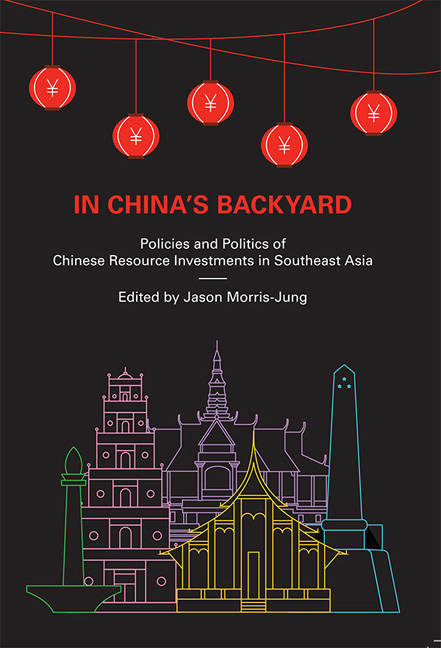Book contents
- Frontmatter
- Contents
- Foreword
- Acknowledgements
- About the Contributors
- 1 Introduction
- 2 Mixed Motivations, Mixed Blessings: Strategies and Motivations for Chinese Energy and Mineral Investments in Southeast Asia
- 3 Mineral Resources in China's “Periphery” Diplomacy
- 4 Energy Entanglement: New Directions for the China–Indonesia Coal Relationship
- 5 Indonesia–China Energy and Mineral Ties: The Rise and Fall of Resource Nationalism?
- 6 The Direction, Patterns, and Practices of Chinese Investments in Philippine Mining
- 7 Development Cooperation with Chinese Characteristics: Opium Replacement and Chinese Rubber Investments in Northern Laos
- 8 The High Cost of Effective Sovereignty: Chinese Resource Access in Cambodia
- 9 Complex Contestation of Chinese Energy and Resource Investments in Myanmar
- 10 Anti-Chinese Protest in Vietnam: Complex Conjunctures of Resource Governance, Geopolitics and State–Society Deadlock
- 11 Complexities of Chinese Involvement in Mining in the Philippines
- 12 Conclusion
- Bibliography
- Index
11 - Complexities of Chinese Involvement in Mining in the Philippines
Published online by Cambridge University Press: 04 July 2018
- Frontmatter
- Contents
- Foreword
- Acknowledgements
- About the Contributors
- 1 Introduction
- 2 Mixed Motivations, Mixed Blessings: Strategies and Motivations for Chinese Energy and Mineral Investments in Southeast Asia
- 3 Mineral Resources in China's “Periphery” Diplomacy
- 4 Energy Entanglement: New Directions for the China–Indonesia Coal Relationship
- 5 Indonesia–China Energy and Mineral Ties: The Rise and Fall of Resource Nationalism?
- 6 The Direction, Patterns, and Practices of Chinese Investments in Philippine Mining
- 7 Development Cooperation with Chinese Characteristics: Opium Replacement and Chinese Rubber Investments in Northern Laos
- 8 The High Cost of Effective Sovereignty: Chinese Resource Access in Cambodia
- 9 Complex Contestation of Chinese Energy and Resource Investments in Myanmar
- 10 Anti-Chinese Protest in Vietnam: Complex Conjunctures of Resource Governance, Geopolitics and State–Society Deadlock
- 11 Complexities of Chinese Involvement in Mining in the Philippines
- 12 Conclusion
- Bibliography
- Index
Summary
Amid the controversies and historically conflictive and divisive character ofmining in the Philippines, China's entry and involvement in the industryhave made it even more controversial, conflictive and divisive because of theterritorial disputes in the West Philippine Sea (South China Sea). Over thepast five years, there have been a surge of Chinese mining investments anda growing opposition to them in areas where they operate. Opposition toChinese mining is highlighted by over a hundred arrests of Chinese nationalsinvolved in illegal mining operations and suspension orders of Chinese firmsor their dummies. So it raises the big question — why is it that Chinesemining seems to be unwelcome and yet it continues to pour in and expand?In this article, the complexities of Chinese involvement in Philippine miningare discussed and examined. The article starts with the current situationof mining in the Philippines and the relevant mining-related laws, which,apparently, are being exploited by Chinese mining investors to serve theirinterests. To contextualize the widespread opposition to mining in general,contributions of mining to local development and poverty incidence areevaluated. Recommendations on how to reduce the controversies, tensionsand conflict brought about by Chinese mining in local communities areoutlined
Introduction
When the Philippine Supreme Court issued a Temporary Environmental Protection Order (TEPO) against ninety-four “small-scale mines” in the Province of Zambales in 2013, the media touted the decision as anti- China, rather than pro-environment or anti-mining. Many of the big small-scale mines enjoined by the TEPO to “perform or desist from performing an act in order to protect, preserve, or rehabilitate the environment” are reported to be dummies of Chinese firms. The case was filed by concerned members of local communities of the province who complained that the mining operations were allegedly outside the designated allowable mining area, were polluting the environment, were unregulated and untaxed. Local and national government officials were also respondents to the case.
Mining in general in the Philippines has been controversial and divisive. On the one hand, mining operations have been described by civil society groups and the Catholic Church as destructive to traditional livelihoods. On the other hand, mining has also catalyzed vibrant economic activities through job creation, infrastructure works and business establishments in economically stagnating localities. Thus, government officials and businessmen tend to favour and endorse mining projects.
Information
- Type
- Chapter
- Information
- In China's BackyardPolicies and Politics of Chinese Resource Investments in Southeast Asia, pp. 256 - 276Publisher: ISEAS–Yusof Ishak InstitutePrint publication year: 2017
